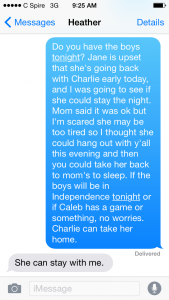https://archive.org/stream/500-best-topics-for-argumentative-and-persuasive-essay/500_BEST_TOPICS_FOR_ARGUMENTATIVE_PERSUASIVE_ESSAYS?ui=embed#page/n0/mode/1up
Monthly Archives: October 2015
Daily Write
There is a huge difference between writing a texting as a whole. When you are writing you aren’t writing it too one specific person, you are writing it for the general public too see if they like your opinion. Also when you are generally trying to write a lot more than you would text. When you text you send it straight too certain people and generally in a shorter length.
Daily Write – 10/14 – Anne Lamott’s “Perfectionism”
At the end of Lamott’s essay on how “Perfectionism” can ruin good writing, she leaves readers with this line: “What people somehow (inadvertently, I’m sure) forgot to mention when we were children was that we need to make messes in order to find out who we are and why we are here, and, by extension, what we’re supposed to be writing.”
I love reading Lamott’s work because it is so accessible and because it shows us that writing is so closely entwined with everyday life, even though many of us don’t see it that way, unfortunately. It is true that as a writing teacher, I see students struggle with this need to be perfect in their writing, so perfect that they squeeze out the life and voice of their writing in ways that hinder instead of help their essays. An example would be the student sample for the Discourse Community Analysis. It is so tight…so strict and set to its formula…that it makes the piece boring. I don’t think that student was boring. I think that student is living a pretty cool life. Hey, she loves Harry Potter, and there ain’t nothin’ wrong with that! But, because of this need to fulfill somebody’s version of what a good assignment is, she let the life go out of her work.
I know I have high expectations of my students’ writing, but it’s because I value process. Perfectionism hinders the process. This assumption that we can sit down and write perfectly in one setting is ludicrous and harmful. But, when we give our selves adequate time, when we step away from the process to reflect on it, discuss it, etc, we’ll go back to it refreshed, with new ideas. That’s the point I’m trying to make in this week.
IT’S MRS. BUCKLEY’S BIRTHDAY!! 10/12
Daily Write What my discourse map has taught me
I focused on the way I communicate with my parents, the way I communicate with people in class, the way I communicate around my friends and the way I communicate with people I don’t really know.
When communicating with my parents I always try to be on my best behavior so that when I’m out they never have to worry about me. With my friends I’m pretty energetic and loud. In class I am a lot more quiet than usual cause I don’t feel comfortable talking to people during class. and Finally, when I talk to strangers I try to be super friendly and nice to they feel comfortable around me.
Daily Write, 10/12 What My Discourse Community Map Has to Teach Me
For the weekend homework, I focused on four discourse communities of mine. The way I communicate with my daughter, Jane. The way I communicate as a teacher (my Mrs. B identity). The way I communicate with a church group I’m apart of (the Neighborhood Life Committee). And the way I communicate in my professional setting (the University of Mississippi Writing Project).
What I notice that I’m proud of in the way I communicate is that I really try and capture some of Jane’s moments in writing, either through blogging, my HuffPost work, or through journaling/emailing her “future self.” Of course, we also share notes (Jane can’t write yet, but we draw pics and leave them in funny places). She has something drawn for me almost every day, and I always put it on the fridge or in a prominent place. One of my favorite things I do to communicate with Jane’s “adult” self is keeping a journal to her. I started it about a year before I got pregnant, when I’d first started thinking about motherhood. I can’t wait to give it to her years from now so that she can see this realistic side of being a woman and starting a family.
What I notice that’s problematic about the way I communicate is that I rarely interact with UMWP or NBL unless I have a specific role to play. Life gets to busy, and there is far more going on in these two committees than I can be apart of with working and taking care of my kiddo. So I’ll sign up every once in a while for a job (VBS in the summer, Transitioning Symposium, the All Saints Christmas Dinner), and I feel good about those things, but I avoid all else. It makes me question whether or not my heart is really into the work or whether or not I just see my committee work as a “social obligation.”
Overall, I’m a writer, so I think communication is sorta built into my identity in a way that it may not be for other people. I love to talk. I love to write. I love to write about talking. I love to talk about writing.
My sister and me
So, I love my sister, but we’re so different. I can’t even begin to explain all the ways in which we are different. But, I do have a great visual to illustrate it. It’s a sample text message I received from her just this morning. Heather doesn’t communicate very well. She hates to be “chatty;” she’s not the fun type to go out with on a girl’s night. She’s not one to use a lot of exclamation points in her messages. She’s straight to the point. Sometimes I don’t know how to read that. Like in this message about watching my daughter this weekend. When she messages back, “She can stay with me,” I can’t tell if that’s exciting for her or if it makes her mad (like I’ve now ruined her Friday evening). She gives no other details, no emojis to express her feelings more fully. And when I’ve asked her about it, she’ll say she just doesn’t like using all of that stuff when texting. Of course, I have tons of exclamation points. I use emojis when I text because I feel like it gives people a better understanding of my thought process (or at least the feelings behind what I have to say). I really wish she’d take a hint because I have no idea sometimes where she stands on things. Here’s the text:
Syrian crisis
When I first heard about the immigration issue of the Syrian people I grew very interested. I guess because here at home we don’t experience the sort of problems they are. I would like to believe that all around there’s peace but its not. We cant let the tragedy of a situation go ignored , just because the problem didn’t hit home doesn’t mean we aren’t suppose to help.
All 7 Continents make up the world and there comes a time we should put aside our differences and help thy brother and uplift up thy sister. Look past the color of skin, the texture of hair, or whatever else that may differ from us, Its sad that it took the life of a little boy to make our heads turn. It saddens me to think what our world is coming to . I want to change the world but I can only do so much, it would take a whole nation to change the situation.
What’s holding us back from rising up, speaking out ,and taking action?
It hurts even more to know higher authorities know about certain situations and they cover their eyes. If money or valuable information or resources aren’t involved they don’t seem to get involved
Its time to wake up, if we sit back and watch the world fall apart around us then eventually we are going to fall too, because even if we don’t want to admit…. it we need one another
“Writer’s Block at the Tomb” – My Response
I truly love this blog post for its simplicity of words but its depth of heart.
The way Fiering juxtaposes her memories of her father with those of her beloved brother is soothing to me and helps me to understand the difficulties all families face in the wake of death. It also makes me think about the ways in which we communicate. The way that Fiering and her brother Andrew had so much trouble coming up with a simple engraving for her father’s tombstone…that resonated with me. Her aunt felt like it was such a simple decision, but as brief as the words needed to be, it took months for them to think about it (and thankfully, the aunt just did it for them).
When faced with her brother’s demise, Fiering’s mother had “writer’s block,” when trying to convey her final message to him. Like most faced with death, she wanted to deny it, saying a miracle could still happen. Luckily, Fiering convinced her to tell him her final words.
I laughed when Fiering felt resentment toward her sister-in-law for leaving her voice out of her brother’s tombstone message. It’s so typical of sibling relationships. They are some of the closest bonds we can have, but they become a side note as we enter adulthood.
Of course, Fiering finding that final note from her brother resonated with me as well. It made me think about my own family dynamics. I grew up very close to my younger brother, Billy. We’ve grown apart over the years as we both have families of our own, but regardless of that, each year, he writes me funny birthday cards. I look forward to them every year, and he didn’t disappoint this last week when he gave me a “Happy 40th birthday” card and commenced to talk to me about the troubles of middle age. I AM NOT FORTY, by the way. I’ve got a ways to go for all that. But, it was a hilarious note about the fact that we are all getting older, our children are getting so big, and life’s just charging along like crazy, but to him, we’re still little kids. That’s the beauty of having a sibling. They will always see you as you were then.
Loved this piece. Hope all of you did too. Hope it got you thinking about your family as its own discourse community, with its own strains and its own triumphs.



